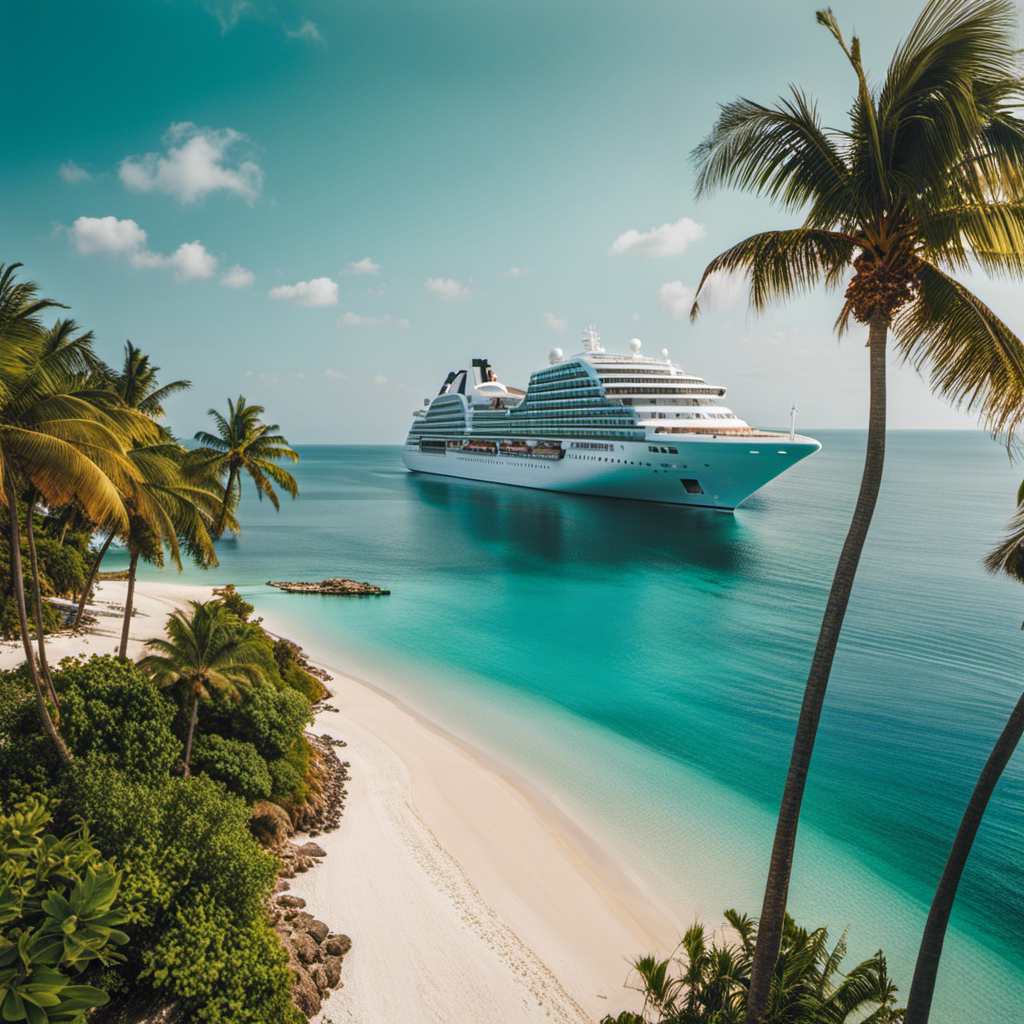As an individual eagerly anticipating the return of Carnival’s cruises from Texas, the recent passage of the Texas Vaccine Legislation has caused me concern.
This new law, similar to the one in Florida, prohibits businesses from requiring proof of vaccination. While it doesn’t explicitly mention cruise lines like Carnival, there may still be implications for their operations.
With Carnival’s recently announced fully-vaccinated cruises aligning with CDC guidelines, the potential delays and uncertainty caused by this law cast a shadow of doubt on their return.
Key Takeaways
- Texas is passing a law prohibiting businesses from requiring proof of vaccination, similar to Florida’s law.
- The law does not explicitly mention cruise companies like Carnival, but state agencies may require compliance for licenses, permits, or state authorizations.
- Carnival recently announced fully-vaccinated cruises from Galveston, but it is unclear if the new law will affect their operations.
- The return of sailing for Carnival and other cruise lines remains uncertain, and the law may potentially add more hurdles and delays.
Prohibiting Proof of Vaccination: The Texas Vaccine Law
It’s uncertain if the Texas Vaccine Law will affect Carnival’s requirement for proof of vaccination. The new law, which prohibits businesses from asking for documentation certifying COVID-19 vaccination, could have legal implications on Carnival’s vaccination requirements.
While the law does not explicitly mention cruise companies, it may still apply to them through state agency regulations. Carnival recently announced fully-vaccinated cruises from Galveston, requiring guests to show proof of vaccination in accordance with CDC guidelines. However, the Texas Vaccine Law could pose a potential hurdle for Carnival’s plans.
State agencies may require compliance for licenses, permits, or state authorizations, which could impact the cruise line’s operations. The implications of the law on Carnival’s vaccination requirements remain uncertain, but it is a situation that warrants careful consideration and monitoring.
Similarities to Florida: Implications for Carnival’s Return
As a cruise enthusiast, I’m concerned about the potential implications for Carnival’s return due to the similarities between the Texas and Florida vaccine laws.
-
Uncertain Impact: The Texas vaccine law, which prohibits businesses from requiring proof of vaccination, could potentially affect cruise lines like Carnival. While the law doesn’t explicitly mention cruise companies, state agencies may still require compliance for licenses and permits.
-
Bad Timing for Carnival: This potential hurdle comes at a bad time for Carnival, as they recently announced fully-vaccinated cruises from Galveston. These cruises require guests to show proof of vaccination, in accordance with CDC guidelines. However, the law’s prohibition on asking for documentation certifying COVID-19 vaccination could pose a challenge for the company.
-
The Return of Sailing: The return of sailing from Texas remains uncertain. The language of the law may not significantly affect cruise lines, but additional hurdles, such as potentially required simulated voyages, could further delay their return. Cruise lines, including Carnival, are already facing numerous challenges, and this similarity between the Texas and Florida vaccine laws adds to their list of concerns.
State Agency Compliance: Potential Roadblock for Cruise Lines
Concerns arise regarding the potential roadblock for cruise lines due to potential state agency compliance requirements.
State agencies may impose certain regulations and compliance measures on cruise lines, which could potentially lead to delays in their return to sailing. These compliance requirements could include obtaining licenses, permits, or state authorizations, all of which would need to be met before cruise lines can resume operations.
The language of the recently passed Texas vaccine law does not explicitly mention cruise companies, leaving uncertainty about its impact on them. However, if state agencies interpret the law to require compliance from cruise lines, it could pose a significant challenge for their return.
With the already existing hurdles faced by cruise lines, such as the need for simulated voyages and changing CDC guidelines, potential delays caused by state agency compliance requirements are an added concern that could further prolong the return of sailing.
Carnival’s Fully-Vaccinated Cruises: Adjustments and Requirements
I’m excited to learn about the adjustments and requirements for fully-vaccinated cruises by Carnival. It’s great to see a major cruise line taking proactive steps to ensure the safety of its passengers and crew.
Carnival’s vaccination policy aligns with the CDC guidelines for vaccinated cruises, which is a crucial aspect of resuming operations in a responsible manner. Here are the key points to note regarding Carnival’s fully-vaccinated cruises:
- Guests must have received their final dose of a CDC-approved COVID-19 vaccine.
- Proof of vaccination is required, ensuring a vaccinated environment onboard.
- These requirements are in accordance with the CDC guidelines, providing an added layer of assurance for passengers.
By implementing these measures, Carnival is prioritizing the health and well-being of everyone on board. This not only enhances the safety of the cruise experience but also instills confidence among potential passengers.
It’s encouraging to see cruise lines adapting and following the recommended protocols to create a safer environment for cruising.
CDC Guidelines: Easier Return for Vaccinated Cruises
Navigating the CDC guidelines for vaccinated cruises has become easier, allowing cruise lines to resume operations more smoothly. The relaxed restrictions and vaccination requirements have created a path for a safer and more enjoyable cruising experience. The CDC now allows cruise lines to skip simulated test cruises, saving time and resources. Additionally, the rules for passengers on vaccinated cruises have been relaxed, giving cruise lines more flexibility in implementing safety measures such as masks and social distancing. Testing before boarding may not be required, further streamlining the process. These changes have provided a much-needed boost for the cruise industry, as they can now focus on providing a safe and enjoyable vacation experience for fully vaccinated passengers. With the CDC guidelines in place, the return of sailing is becoming more certain and promising.
| CDC Guidelines for Vaccinated Cruises |
|---|
| Relaxed restrictions |
| Vaccination requirements |
| Skipped simulated test cruises |
| Flexibility in implementing safety measures |
| No testing before boarding |
Uncertainty Surrounding the Law: Potential Delays for Carnival
The potential hurdles created by the Texas law may cause delays for Carnival and other cruise lines. This uncertainty surrounding the law could lead to potential complications and cruise industry setbacks. Here are four key points to consider:
-
Law’s Ambiguity: The Texas law does not explicitly mention cruise companies, leaving it unclear if it will affect Carnival and other cruise lines. However, state agencies may require compliance for licenses, permits, or state authorizations, which could pose challenges for cruise operations.
-
Carnival’s Fully-Vaccinated Cruises: Carnival has recently announced fully-vaccinated cruises from Galveston, requiring proof of vaccination in accordance with CDC guidelines. However, the law’s restrictions on businesses asking for vaccination documentation may impact these sailings.
-
Easier CDC Rules for Vaccinated Cruises: The CDC has provided cruise lines with an easier path for return through fully-vaccinated sailings. However, potential delays caused by the Texas law could hinder the implementation of these relaxed guidelines.
-
Uncertainty and Potential Delays: The language of the law and its impact on cruise lines remains uncertain. If compliance hurdles arise, such as the need for simulated voyages, it could further delay the return of sailing from Texas, creating setbacks for the cruise industry as a whole.
Simulated Voyages: Possible Impact on Carnival’s Return
Preparing for simulated voyages presents potential challenges for the cruise industry, as they may add additional time and uncertainty to the resumption of sailing. These simulated voyages, required by the CDC for cruise lines to demonstrate their ability to safely operate, can significantly impact the industry’s return. Not only do they require extensive planning and coordination, but they also introduce the possibility of delays. Cruise lines must ensure that they meet all the necessary requirements and protocols before they can resume regular operations. This includes conducting trial voyages with volunteer passengers to test their new health and safety measures. While these simulated voyages are crucial for the industry’s recovery, they also introduce potential delays, as any issues identified during these trials must be resolved before the cruise line can receive approval to sail. Therefore, it is essential for cruise lines like Carnival to carefully navigate these challenges to ensure a smooth and timely return to the seas.
| Simulated Voyages: Impact on Cruise Industry | Potential Delays |
|---|---|
| Require extensive planning and coordination | Additional time needed for preparation |
| Necessary for demonstrating safe operations | Issues identified during trials may cause delays |
| Crucial for industry’s recovery | Resolution of any problems before approval to sail |
Language of the Law: How It Affects Cruise Lines
I’m unsure how this law will specifically affect cruise lines. However, there are potential cruise impact and legal implications that need to be considered.
- The law does not explicitly mention cruise companies, which leaves room for interpretation.
- State agencies may require compliance for licenses, permits, or state authorizations, which could pose challenges for cruise lines operating in Texas.
- Carnival recently announced fully-vaccinated cruises from Galveston, which may now face obstacles due to the new law.
- The potential hurdle comes at a bad time for Carnival, as they were preparing to resume operations.
- The return of sailing remains uncertain, and the language of the law may add further delays and complications for cruise lines.
Overall, the legal implications of this law raise concerns for the cruise industry. It is crucial to closely monitor its potential impact on Carnival and other cruise lines operating in Texas.
Navigating Additional Hurdles: Challenges for Carnival’s Return
Navigating additional hurdles, the challenges for resuming operations for cruise lines like Carnival are uncertain due to the new law. While the Texas vaccine law does not explicitly mention cruise companies, state agencies may require compliance for licenses, permits, or state authorizations.
This potential hurdle comes at a bad time for Carnival, as they recently announced fully-vaccinated cruises from Galveston. Carnival has adjusted their sailings to allow only fully-vaccinated passengers, in accordance with CDC guidelines. However, the law prohibits businesses from asking for documentation certifying COVID-19 vaccination.
The language of the law may not significantly affect cruise lines, but it does introduce additional challenges that they didn’t need. As a result, the return of sailing remains uncertain, and potential delays, such as the requirement for simulated voyages, may further prolong Carnival’s resumption of operations.
Frequently Asked Questions
How Does the Texas Vaccine Law Affect Businesses’ Ability to Ask for Proof of Vaccination?
The Texas vaccine law restricts businesses from requesting proof of vaccination, impacting their ability to ensure the safety of employees and customers. This legal implication raises concerns about public health and the potential spread of COVID-19.
Will the Texas Vaccine Law Impact Carnival and Other Cruise Lines Operating in Texas?
The impact of the Texas vaccine law on Carnival and other cruise lines operating in Texas remains uncertain. Legal challenges and potential hurdles may arise, adding to the already uncertain return of the cruise industry.
What Requirements Do Passengers Need to Meet in Order to Participate in Carnival’s Fully-Vaccinated Cruises?
To participate in Carnival’s fully-vaccinated cruises, passengers must provide proof of vaccination. This requirement ensures the safety of all guests and aligns with CDC guidelines. It’s an essential step towards a successful and worry-free sailing experience.
How Do the CDC Guidelines Make It Easier for Cruise Lines to Return With Fully-Vaccinated Sailings?
The CDC guidelines provide a smoother path for cruise lines to resume fully-vaccinated sailings. Simulated voyages can be skipped, rules for passengers are relaxed, and masks may not be required. It eases the return process amidst uncertainties and potential delays.
What Are Some Potential Delays and Uncertainties That Carnival May Face Due to the Texas Vaccine Law?
Potential delays and uncertainties that Carnival may face include the impact of the Texas Vaccine Law on their return. The law may affect businesses’ ability to require proof of vaccination, potentially impacting Carnival’s passengers’ requirements and compliance with CDC guidelines for fully vaccinated cruises.










